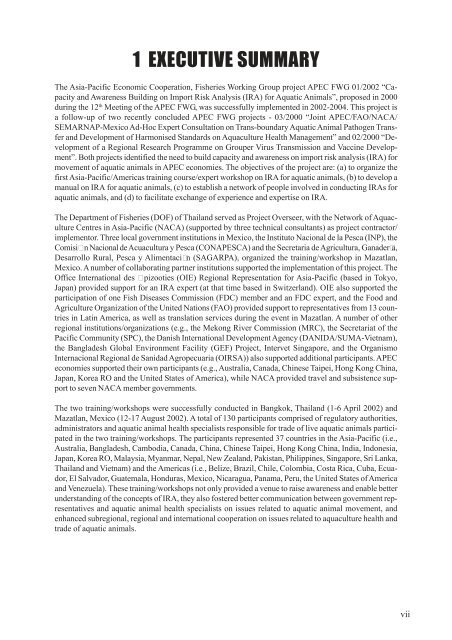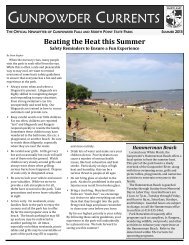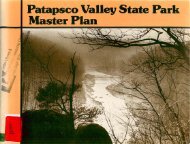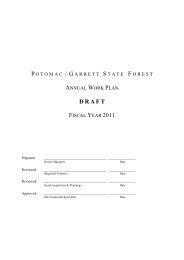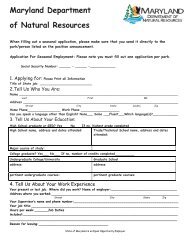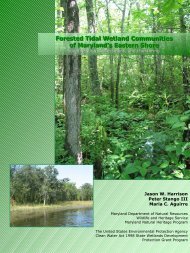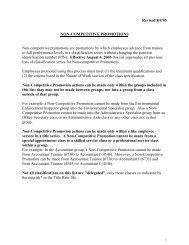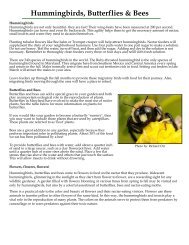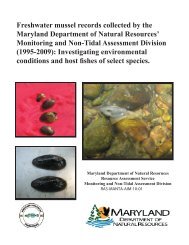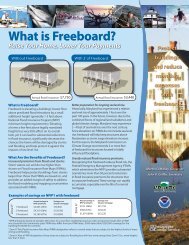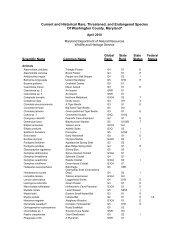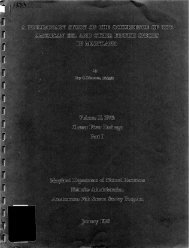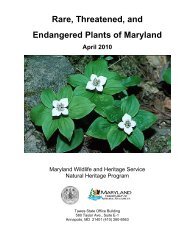NAca Section 2.pmd - Maryland Department of Natural Resources
NAca Section 2.pmd - Maryland Department of Natural Resources
NAca Section 2.pmd - Maryland Department of Natural Resources
You also want an ePaper? Increase the reach of your titles
YUMPU automatically turns print PDFs into web optimized ePapers that Google loves.
1 EXECUTIVE SUMMARY<br />
The Asia-Pacific Economic Cooperation, Fisheries Working Group project APEC FWG 01/2002 “Capacity<br />
and Awareness Building on Import Risk Analysis (IRA) for Aquatic Animals”, proposed in 2000<br />
during the 12 th Meeting <strong>of</strong> the APEC FWG, was successfully implemented in 2002-2004. This project is<br />
a follow-up <strong>of</strong> two recently concluded APEC FWG projects - 03/2000 “Joint APEC/FAO/NACA/<br />
SEMARNAP-Mexico Ad-Hoc Expert Consultation on Trans-boundary Aquatic Animal Pathogen Transfer<br />
and Development <strong>of</strong> Harmonised Standards on Aquaculture Health Management” and 02/2000 “Development<br />
<strong>of</strong> a Regional Research Programme on Grouper Virus Transmission and Vaccine Development”.<br />
Both projects identified the need to build capacity and awareness on import risk analysis (IRA) for<br />
movement <strong>of</strong> aquatic animals in APEC economies. The objectives <strong>of</strong> the project are: (a) to organize the<br />
first Asia-Pacific/Americas training course/expert workshop on IRA for aquatic animals, (b) to develop a<br />
manual on IRA for aquatic animals, (c) to establish a network <strong>of</strong> people involved in conducting IRAs for<br />
aquatic animals, and (d) to facilitate exchange <strong>of</strong> experience and expertise on IRA.<br />
The <strong>Department</strong> <strong>of</strong> Fisheries (DOF) <strong>of</strong> Thailand served as Project Overseer, with the Network <strong>of</strong> Aquaculture<br />
Centres in Asia-Pacific (NACA) (supported by three technical consultants) as project contractor/<br />
implementor. Three local government institutions in Mexico, the Instituto Nacional de la Pesca (INP), the<br />
Comisión Nacional de Acuacultura y Pesca (CONAPESCA) and the Secretaria de Agricultura, Ganaderóa,<br />
Desarrollo Rural, Pesca y Alimentación (SAGARPA), organized the training/workshop in Mazatlan,<br />
Mexico. A number <strong>of</strong> collaborating partner institutions supported the implementation <strong>of</strong> this project. The<br />
Office International des ópizooties (OIE) Regional Representation for Asia-Pacific (based in Tokyo,<br />
Japan) provided support for an IRA expert (at that time based in Switzerland). OIE also supported the<br />
participation <strong>of</strong> one Fish Diseases Commission (FDC) member and an FDC expert, and the Food and<br />
Agriculture Organization <strong>of</strong> the United Nations (FAO) provided support to representatives from 13 countries<br />
in Latin America, as well as translation services during the event in Mazatlan. A number <strong>of</strong> other<br />
regional institutions/organizations (e.g., the Mekong River Commission (MRC), the Secretariat <strong>of</strong> the<br />
Pacific Community (SPC), the Danish International Development Agency (DANIDA/SUMA-Vietnam),<br />
the Bangladesh Global Environment Facility (GEF) Project, Intervet Singapore, and the Organismo<br />
Internacional Regional de Sanidad Agropecuaria (OIRSA)) also supported additional participants. APEC<br />
economies supported their own participants (e.g., Australia, Canada, Chinese Taipei, Hong Kong China,<br />
Japan, Korea RO and the United States <strong>of</strong> America), while NACA provided travel and subsistence support<br />
to seven NACA member governments.<br />
The two training/workshops were successfully conducted in Bangkok, Thailand (1-6 April 2002) and<br />
Mazatlan, Mexico (12-17 August 2002). A total <strong>of</strong> 130 participants comprised <strong>of</strong> regulatory authorities,<br />
administrators and aquatic animal health specialists responsible for trade <strong>of</strong> live aquatic animals participated<br />
in the two training/workshops. The participants represented 37 countries in the Asia-Pacific (i.e.,<br />
Australia, Bangladesh, Cambodia, Canada, China, Chinese Taipei, Hong Kong China, India, Indonesia,<br />
Japan, Korea RO, Malaysia, Myanmar, Nepal, New Zealand, Pakistan, Philippines, Singapore, Sri Lanka,<br />
Thailand and Vietnam) and the Americas (i.e., Belize, Brazil, Chile, Colombia, Costa Rica, Cuba, Ecuador,<br />
El Salvador, Guatemala, Honduras, Mexico, Nicaragua, Panama, Peru, the United States <strong>of</strong> America<br />
and Venezuela). These training/workshops not only provided a venue to raise awareness and enable better<br />
understanding <strong>of</strong> the concepts <strong>of</strong> IRA, they also fostered better communication between government representatives<br />
and aquatic animal health specialists on issues related to aquatic animal movement, and<br />
enhanced subregional, regional and international cooperation on issues related to aquaculture health and<br />
trade <strong>of</strong> aquatic animals.<br />
vii


